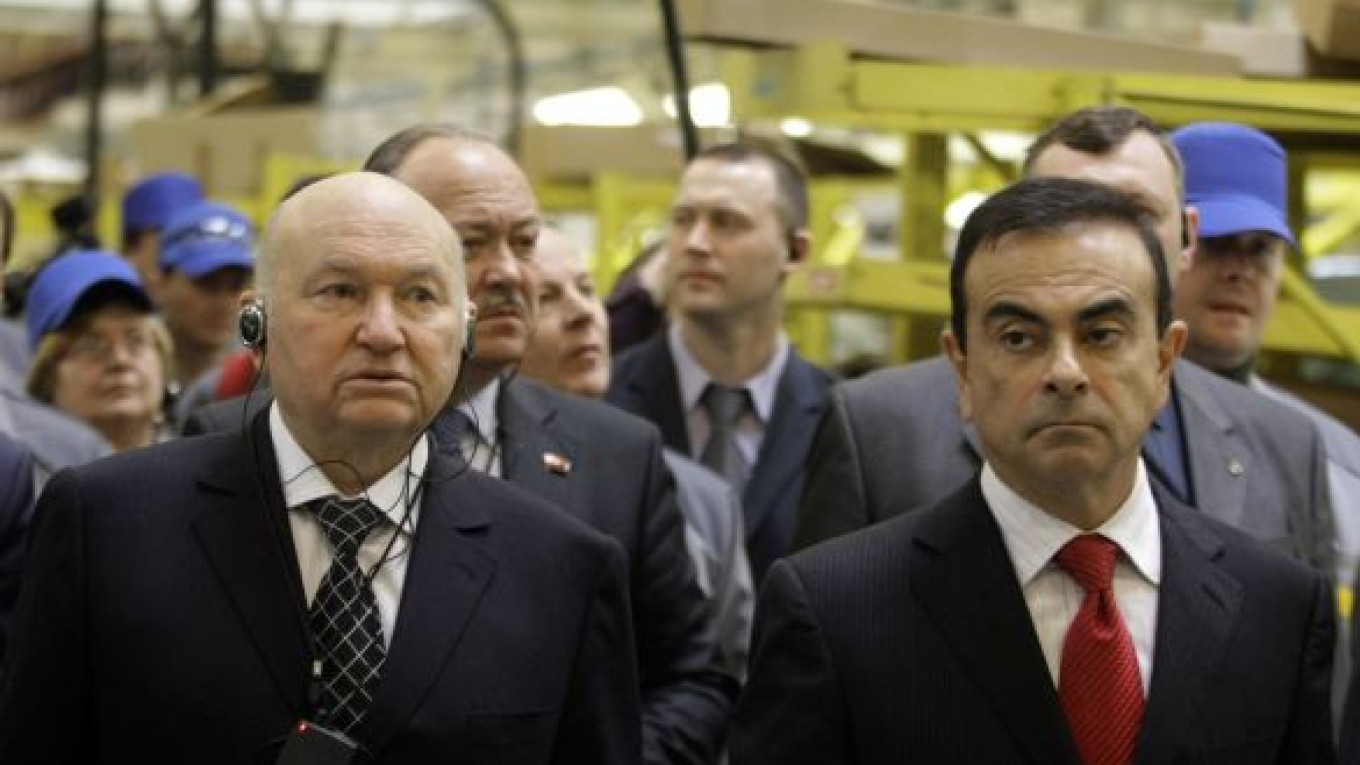Renault put the wheels in motion Monday to pull off a feat that even the boxy Moskvich failed to achieve at the height of its Soviet glory.
The French car giant expanded production and introduced a new Sandero model at the former Moskvich plant with an eye on doubling capacity to 160,000 cars per year by 2011, surpassing the 120,000 Moskvich sedans that rolled out of the plant annually before the Soviet-era carmaker fell on hard times in the 1990s.
But there is a possible catch, Renault Nissan CEO Carlos Ghosn told Prime Minister Vladimir Putin during a quick meeting at Vnukovo Airport, where Putin landed after a trip to the North Caucasus.
"The only issue that concerns us is suppliers," Ghosn said.
He said Deputy Prime Minister Igor Sechin had "promised to give financial support to suppliers" at talks earlier Monday. Renault, for its part, will help Russian suppliers set up joint ventures, he said, Prime-Tass reported.
Renault has invested 150 million euros ($200 million) into doubling capacity at Avtoframos, the joint venture between Renault and the Moscow city administration that operates at the former Moskvich plant. This year, Renault will produce 80,000 Logan and Sandero cars, with market demand dictating the share of each model. Production will reach 160,000 cars next year, and the Duster light SUV will be introduced in late 2011.
Mayor Yury Luzhkov praised Renault for its "almost reckless decision" to invest in the "lost Moskvich plant" in 1998, the year that Avtoframos was created and the Russian government defaulted on its debt.
The plant was built in the 1930s and assembled Ford-A and Ford-AA cars prior to the Moskvich model. Most of the space is now used by Avtoframos, which is 94.6 percent owned by Renault and the rest by City Hall.
The Sandero, with a retail price of about 300,000 rubles ($10,000), is 44 percent Russian-made, but the goal is to raise localization at Avtoframos to 75 percent in two to three years, said the head of Renault Russia, Christian Esteve.
City Hall has prepared another 300,000 square meters for suppliers to use, even though a project to localize steel body parts has been "going tough," said Yevgeny Panteleyev, head of City Hall's industry department.
Russia has "the biggest potential," Ghosn said at the plant, noting that ownership is still at 230 cars per 1,000 people and the average car is 12 years old. Even adding another 25 million cars to the market would raise ownership to about 450 cars per 1,000, far below the 600 cars per 1,000 people in Western Europe, Ghosn said.
"We believe the car market in Russia has bottomed out, and we should see a recovery," Ghosn said.
Putin told Ghosn later at the airport that component production in Russia would be discussed at a government meeting Thursday. The meeting, which was pushed back from last week, will be dedicated to the future of the car industry in Russia.
Putin said he "did not rule out" boosting state sponsorship of Renault's Formula-1 team, whose pilot is Russian Vitaly Petrov.
Petrov's uniform and his car will bear Lada logos, Putin said. "It would be fair, since we have planned a whole series of cars on a new platform with Renault's participation but under the traditional Lada name," Putin said.
Renault has invested $1 billion for a 25 percent stake in Lada's AvtoVAZ plant in Tolyatti. Putin threatened to dilute the stake last year if Renault failed to plow more money into the struggling carmaker. Ghosn indicated in an interview with Reuters that Renault might increase its stake in AvtoVAZ if the government asked.
Putin promised to continue state support of AvtoVAZ and separate all social infrastructure from the plant, Tolyatti's main employer, to help it cut costs.
AvtoVAZ's business plan was overviewed by the management Friday and will be discussed by its board of directors Wednesday, CEO Igor Komarov said on the sidelines of the Renault ceremony Monday. AvtoVAZ expects to have a positive cash flow in 2010, he said.
Putin also invited Ghosn to consider opening a Nissan plant in the Far East, where "people … are used to Japanese cars."
"Nissan would be most welcome," Putin said.
A Message from The Moscow Times:
Dear readers,
We are facing unprecedented challenges. Russia's Prosecutor General's Office has designated The Moscow Times as an "undesirable" organization, criminalizing our work and putting our staff at risk of prosecution. This follows our earlier unjust labeling as a "foreign agent."
These actions are direct attempts to silence independent journalism in Russia. The authorities claim our work "discredits the decisions of the Russian leadership." We see things differently: we strive to provide accurate, unbiased reporting on Russia.
We, the journalists of The Moscow Times, refuse to be silenced. But to continue our work, we need your help.
Your support, no matter how small, makes a world of difference. If you can, please support us monthly starting from just $2. It's quick to set up, and every contribution makes a significant impact.
By supporting The Moscow Times, you're defending open, independent journalism in the face of repression. Thank you for standing with us.
Remind me later.


